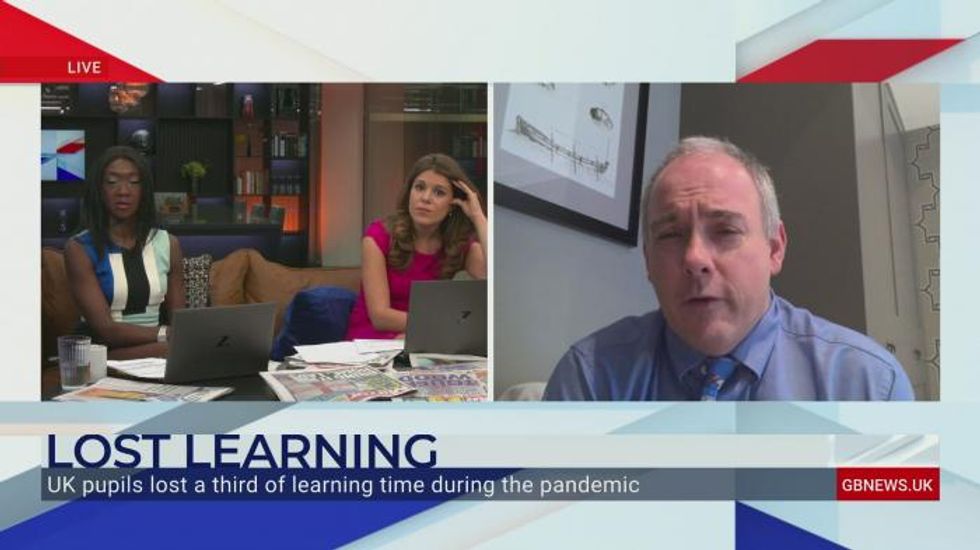Robert Halfon said the Covid-19 had led to a "national emergency", after a study found pupils across the UK lost out on a third of learning time during the pandemic
Don't Miss
Most Read
Trending on GB News
Schools should provide the option of opening during the summer holiday and on weekends to help kids catch-up on education lost during the Covid-19 pandemic, the chair of the education select committee told GB News.
Robert Halfon said the Covid-19 had led to a "national emergency" which had hit children from disadvantaged backgrounds particularly hard, after a study found pupils across the UK lost out on a third of learning time during the pandemic.
Asked whether he'd like to see additional programmes put on to help recuperate some of the lost time from Covid, Mr Halfon said: "Some schools will be doing this, and there is a summer holidays programme which the government had instituted for disadvantaged pupils of around £200-300m.
"I would favour some of that money being used not just in the summer, but also on weekends. I think we're in nothing short of a national emergency when it comes to our children.
Nearly two in five disadvantaged students are not confident they will receive fair grades that reflect their ability, under the teacher assessment system this summer, a report suggests. Issue date: Sunday June 20, 2021.
Brian Lawless
"We need to take radical action to remedy what has gone on in the past year."
Researchers from the London School of Economics and Political Science (LSE) and the University of Exeter found that the poorest pupils suffered larger learning losses than their richer peers amid the pandemic.
Considering learning undertaken at home and in the classroom, the analysis suggests pupils in England on average lost 61 days of schooling between March 2020 and April 2021. The usual school year is 190 days. Larger average losses occurred in Scotland (64 days) and Wales (66 days), while pupils in Northern Ireland also lost 61 days.
The report suggests that the poorest pupils in England lost 34.9% of their learning during the second round of school closures in 2021 – less than the most affluent pupils in the rest of the UK who lost 38.6% of learning time.
Researchers calculated the education loss by assessing school opening and closure dates, official school attendance figures, and data on daily learning rates (combining home and classroom learning) reported by parents.
The schools bubble system is set to be scrapped, meaning whole classes won't have to self-isolate if a child in their bubble tests positive for Covid-19.
Martin Rickett
Lee Elliot Major, professor of social mobility at the University of Exeter and report co-author, said: “Our analysis reveals that pupils’ learning loss varies between the four home nations, partly due to historical differences in school term times and partly as a result of school closure policies. “This shows that ministers can make a difference – but quick action is needed.”
LSE professor Stephen Machin, CEP director and co-author of the report, said: “Even a few days extra learning loss can have a large impact on educational achievement and life outcomes, and these are big losses of around 60-65 days.
“Learning losses suffered during the pandemic are manifested in stark gaps in attainment between children from poorer backgrounds and their more privileged counterparts, which is likely to cause a significant decline in social mobility for younger generations.”
The findings come after the latest Government figures show that more than 640,000 pupils in England were not in school due to Covid-19 last week – up from around 384,000 the week before. Current rules state that children have to self-isolate for 10 days if another pupil in their bubble – which can be an entire year group at secondary school – tests positive for coronavirus.
Students Ellie Fisher (left) and Beth Hicks (right) take Coronavirus lateral flow tests at Outwood Academy Adwick in Doncaster, ahead of schools and colleges fully reopening on Monday. Picture date: Friday March 5, 2021.
Danny Lawson
But updated Department for Education (DfE) guidance says keeping children in consistent bubbles will not be needed for summer provision, or in the autumn. The report, from the LSE’s Centre for Economic Performance (CEP), found that just over half (53%) of 10,000 adults surveyed support extending the school day to make up for learning losses.
More than two in three (68%) respondents in England support allowing greater flexibility for pupils to repeat a whole school year so they can catch up. Andrew Eyles, CEP research economist, said: “Rapidly rising absences in schools in June 2021 once again prompt discussion about potential policies that could address the learning loss suffered during the pandemic.
“Our survey responses show there is significant public support for two major policies – extending the school day; and allowing pupils to repeat a whole school year.”
A Government spokesperson said: “We have committed to an ambitious, and long-term education recovery plan, including an investment to date of over £3 billion and a significant expansion of our tutoring programme, to support children and young people to make up for learning lost during the pandemic.”
- Do you think schools should be open on weekends and during holidays to help kids catch-up on lost education? Let us know your thoughts in the comments below











